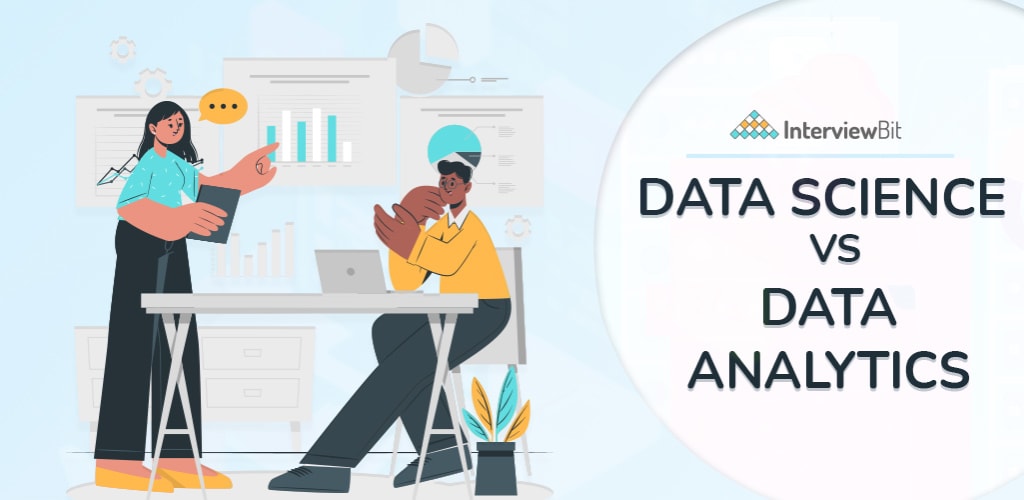Data Analyst vs. Data Scientist:
Recognizing the Main Distinctions and Career Routes

Introduction
Introducing the dynamic pair of the digital age: data scientists and data analysts. Similar to salt and pepper, Batman and Robin, or peanut butter and jelly, these jobs work well together and are necessary for a business to succeed. The need for these specialists has gotten more urgent as all businesses become more data-driven; the cry is being heard in fields including healthcare, banking, e-commerce, and public policy.
We'll go on an investigative journey to clarify the roles of data scientists and analysts in this piece. We hope to shed light on the distinctive contributions that each provides to companies and organizations by outlining the main distinctions and potential career routes. Thus, be ready for an in-depth exploration of their world, where data drives decisions and statistics tell stories, whether you're considering a career change or you're just inquisitive about these data whizzes.
Defining Data Analysts and Data Scientists
Data scientists and analysts are the superheroes at the busy crossroads of business and technology, each using their special abilities. Consider a data analyst as a detective who delves into data to uncover mysteries and solve business problems. They take datasets and turn them into insights that can be put into practice by cleaning, processing, and doing basic analysis. Usually, they ask for a strong foundation in statistics as well as proficiency with analytics software like SQL or Excel.
A data scientist, on the other hand, is more like a visionary because of their advanced algorithms and predictive models that help them forecast the future. Their domain is not limited to analysis; it encompasses the magical woods of predictive modeling and machine learning. In terms of tools, data scientists frequently have advanced degrees and are fluent in Python or R programming languages.
- A data analyst's duties include basic analytical reporting, data processing, and data cleaning.
- A data scientist's responsibilities include developing algorithms, doing sophisticated statistical analysis, and predictive modeling.
Although there is a love of data and its potential shared by both jobs, there are differences in their primary responsibilities and educational backgrounds. While one interprets the evidence as it stands, the other speculates as to what it might reveal as it relates to the future.
Tools and Skill Set Used
Using these data maestros' toolkit, data scientists and analysts can both be skilled at programming and data analysis, which is their specialty. However, the spice rack of their abilities displays a multitude of tastes. For example, they both use SQL a lot to query databases as precisely as a skilled chef chopping and slicing materials. In addition, data scientists frequently work in the more technical field of machine learning, applying algorithms to tasks akin to casting sorcery.
- Data analysts frequently use programs like Tableau and Excel to convert unprocessed data into visually engaging narratives that even non-techies can understand.
- On the other hand, data scientists may use Python or R to subdue data sets and uncover insights that were as concealed as a needle in a haystack.
While both positions use these abilities in the course of their work, data scientists often work in deeper, occasionally murkier data lakes. They are the ones who might be seen diving into structured and unstructured data with scuba gear on, whereas data analysts might choose to stay on the safer side of well-known datasets.
Career Routes for Data Scientists and Analysts
Climbing the professional ladder in data science and analysis may be likened to venturing into a plethora of unique and rich digital ecosystems. When it comes to data analysis, the journey usually starts at the operational level with number crunching and pattern interpretation. As they advance, with a greater focus on strategic decision-making, their positions may change to Chief Data Officer or even Data Analysis Manager.
Big data and predictive analytics are the starting points for data scientists, who are on the other side of the binary split. Their career path might take them from being a data scientist to a lead data scientist and eventually to the position of director of data science, where they would be in charge of creative projects using data.
- Both professions are well-suited to industries like technology, healthcare, and finance.
- Duties move beyond practical data manipulation to include directing data governance and policy.
A job in data is more of an exciting rollercoaster trip into the future of technology than it is a straight line, whether you're threading through databases or weaving complicated algorithms.
Pay and Employment Prospects
Starting a career in data analysis or data science is not only a way to explore the world of data, but it may also lead to financial success. Data analysts should often anticipate a good compensation that is commensurate with their critical role in interpreting data to create compelling stories. However, because of their enhanced proficiency in predictive modeling and machine learning, data scientists frequently enjoy an even greater increase in salary.
Furthermore, both professions have a bright future ahead of them because data-driven decision-making is in high demand across industries, including healthcare and finance. In fact, following a career in data is not only wise, but also progressive in today's data-driven society.
Important Variations in Daily Tasks
Consider a data scientist as a visionary sculptor who shapes the same data into intricate algorithms and predictive models, whereas a data analyst is as a skillful artisan molding raw data into intelligible charts. A data analyst's work usually involves working with statistics all day long to extract important insights from datasets and turn them into reports that inform business choices. They are experts at using programs like SQL and Excel, slicing and dicing data into manageable chunks.
Conversely, a data scientist is frequently observed developing machine learning models, putting theories to the test, and venturing into the uncharted territory of unstructured data. They delve deeply into the vast ocean of big data, utilizing sophisticated Python or R programming to uncover patterns that are hidden from view. Daily journeys have the potential to yield inventive answers to complicated challenges, which in turn can lead to breakthroughs that influence the future of businesses.
- Descriptive analytics is the main emphasis of data analysts.
- Predictive analytics is the study of potential outcomes by data scientists.
The Best Books to Help You Launch Your Career as a Data Scientist or Analyst
1. Data Science from Scratch: First Principles with Python
3. Better Data Visualizations: A Guide for Scholars, Researchers, and Wonks
Click Here and Get Access To All The E-Books
Conclusion
We have discovered the subtle differences between a data scientist and an analyst as we have explored the complexities of data science and analysis. It is evident that both positions offer a great deal of opportunity for professional advancement and are essential parts of the modern data-driven business. There is a road for everyone, regardless of whether you enjoy the challenge of creating algorithms that can forecast the future or the satisfaction of painstakingly refining data sets for useful insights.
The primary distinctions between the daily duties, responsibilities, and the kinds of data and projects that each function works on have been outlined. However, their ability to work together and the importance of having multidisciplinary abilities demonstrate that these professions are not isolated positions. In an era where data is the new oil, good teamwork and communication are essential for moving initiatives forward.
So think for a moment about your hobbies and areas of strength. Do you like in-depth analysis or are you more interested in using predictive modeling to find hidden patterns in data? Your enthusiasm and experience may not only land you a well-paying job but also help to determine the direction of data-driven decision-making in the future as the need for these professions soars.Introducing the dynamic pair of the digital age: data scientists and data analysts. Similar to salt and pepper, Batman and Robin, or peanut butter and jelly, these jobs work well together and are necessary for a business to succeed. The need for these specialists has gotten more urgent as all businesses become more data-driven; the cry is being heard in fields including healthcare, banking, e-commerce, and public policy.
In this article, we’ll embark on an exploratory journey to demystify the roles of data analysts and data scientists. By laying out the key differences and career paths associated with each, we aim to illuminate the unique contributions they make to businesses and organizations. So, if you’re standing at the crossroads of career choices or simply curious about these data whizzes, prepare for a deep dive into their world where numbers tell tales and data dictates decisions.
About the Creator
Roger E.Mitchell
Passionate IT expert exploring cutting-edge trends. Dedicated to sharing insights through concise articles on technology's evolving landscape. Let's navigate the future together.






Comments
There are no comments for this story
Be the first to respond and start the conversation.